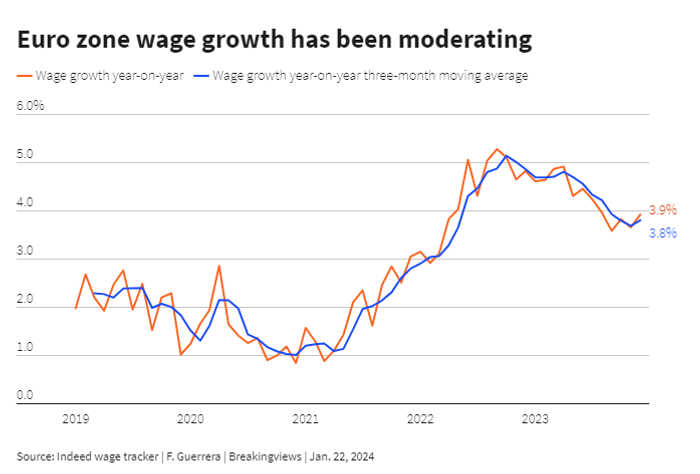Published 17:56 IST, January 24th 2024
ECB is battling an imaginary wage spiral
In the past two years, wages have failed to keep pace with inflation, according to a Breakingviews analysis of wages collected by job search site Indeed.
- Republic Business
- 3 min read

Pay, out. The European Central Bank wants workers to earn less. Without wage restraint, President Christine Lagarde argues, inflation will remain high and so will interest rates. But employees’ earnings are only catching up with price rises. Far from stoking inflation, higher incomes may help the euro zone’s struggling economy.
Crime, famously, doesn’t pay. But neither does working in the euro zone. In the past two years, wages have failed to keep pace with inflation, according to a Breakingviews analysis of wages collected by job search site Indeed. In 2022 and 2023, euro zone prices grew by an annual average of nearly 7%, but wages only grew by around 4.3%.

Despite that, the ECB insists that it needs a meaningful slowdown in pay raises before rates can fall from the current record high of 4%. The minutes of the latest meeting in December recorded policymakers’ concerns that “wage growth was still strong … (with) only limited signals of stabilisation.” Lagarde is likely to repeat the central bank’s fear of a wage spiral that boosts inflation and feeds on itself on Thursday, after an ECB meeting that’s likely to keep rates unchanged.
Admittedly, some earnings data are hot. Unit labour costs – a measure that combines wages with workers’ productivity – rose at an annual rate of 6.6% in the third quarter of 2023, a record pace aside from one quarter during the pandemic. But that data is old, and part of the jump in costs was due to a fall in productivity that should be reversed in coming months as companies stop “hoarding” workers and those who remain have to work harder. The ECB’s own staff predicts that unit labour cost growth will slow to 4.1% in 2024.
Wages are rising even less. Indeed, which tracks wages posted in job ads, estimates that the three-month moving average of euro zone wages rose at an annual rate of 3.8% in December 2023, down from 4.8% in December 2022. That is close to the 3% level the ECB believes to be consistent with its 2% inflation target.
Companies like Swedish furniture retailer IKEA, French energy giant TotalEnergies and the French subsidiary of U.S. ride-hailing group Uber Technologies have raised salaries for their workers. And the German and Dutch governments are among those to have lifted the minimum wage, Reuters reported.
But instead of fuelling inflation, these raises might give the euro zone a much-needed boost. The ECB expects private consumption to rise 1.4% in 2024, below the 1.7% average growth rate between 2015 and 2019. With the bloc’s GDP expected to expand by just 0.8% this year, workers’ bulging pockets need not to be the ECB’s primary concern.
Context News
Financial markets expect the European Central Bank to keep interest rates at a record high at its next policy meeting on Jan. 25. Traders believe there is more than a 90% chance the ECB will hold its benchmark deposit rate at 4%, according to derivatives prices collected by LSEG. At their last gathering in December, ECB policymakers expressed concerns that although inflation is moderating, rising wages may keep it above the central bank’s 2% target for some time, according to minutes of that meeting.
Updated 17:56 IST, January 24th 2024